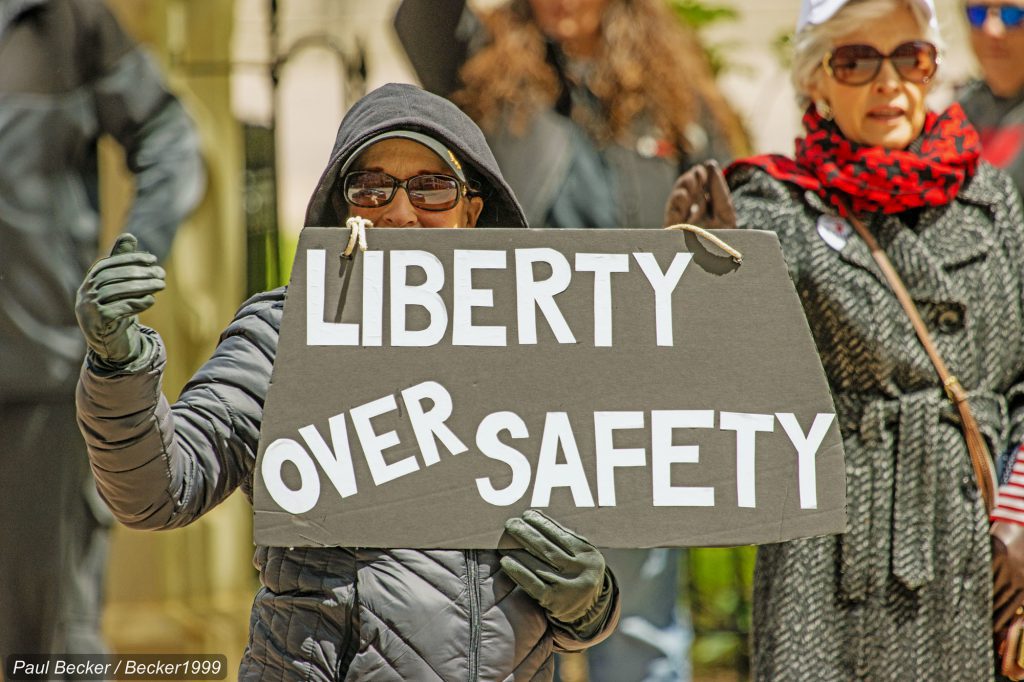
Protests to reopen states are popping up across the country. Mobs of gun-slinging people stormed the Michigan state capitol building, claiming the state’s stay-at-home orders extending the closure of nonessential businesses in order to stave off the coronavirus outbreak is infringing on their freedom. We’ve seen them from Ohio to Florida.
They believe it is their Constitutional right to, for example, get a haircut, or go to the gym. And they’re willing to let people die for that right.
Except, it’s not really their own lives they’re putting at risk. It’s the lives of the black and brown people who disproportionately make up the service industry they are demanding be brought back to work, and who disproportionately are dying from the virus.
It’s the lives of the black and brown people who disproportionately make up the service industry they are demanding be brought back to work, and who disproportionately are dying from the virus.
Because service sector employers often pay low wages, if the state were to reopen, those workers would feel more pressure to get back to work. That pressure comes both from the need to feed their families and from their employers. If they aren’t willing to risk their lives to get back to work, employers will find someone else who is.
And of course if they do return to work they’re more likely to contract the virus. Thanks to decades of policy choices made by political elites that have fueled and sustained racial inequality in work, health, wealth and education, this could be a death sentence for black Americans. In Michigan, African Americans account for 40% of the deaths from the COVID outbreak, even though they make up 14% of the population.
While employers have exploited black workers and politicians have neglected them, protesters wielding guns, confederate flags, and nooses are “demanding black people go back to work,” Rashad Robinson of Color of Change told the Hill.
We already see people making the impossible choice between their health and providing for their family in places that have prematurely reopened. For example, in Georgia a hairdresser with asthma has chosen not to reopen, but now she risks losing loyal customers to competing businesses.
For 39-year-old Michigan resident Antoinette Simpson, going back to work if the state reopened wouldn’t be an option — she has two elementary-school-aged children to homeschool and can’t do her job as a pantry cook for wealthy patrons at an athletic club from home. “I have underlying conditions in my home, it would be too risky for me to get sick and bring the virus home to my family,” she said. “You cannot compete with a virus.”
Despite the obvious consequences to reopening now, President Trump told Michigan Governor Gretchen Whitmer that she should make a deal with the protesters.
And for what? “I’m ready to get a haircut,” Michigan GOP Representative Bill Huizenga told the Atlantic. He argued that if we can find a way to allow people to get groceries, we can figure out how to get him groomed for primetime TV.
Having to choose between risking your life and feeding your family doesn’t sound like real freedom to me. Real freedom would be the ability to shelter in place, keeping our families safe, while knowing that our government will use taxpayer dollars to help us get through this tough time.
For sure, that’s not the motivation for all of the protesters. Some of them are truly struggling financially and want to get back to work themselves. But having to choose between risking your life and feeding your family doesn’t sound like real freedom to me.
Real freedom would be the ability to shelter in place, keeping our families safe, while knowing that our government will use taxpayer dollars to help us get through this tough time.
Real freedom would be having a Congress that understands the need not only for short-term fixes such as paying employers to keep workers on their payroll and getting more money to states, but also long-term fixes such as a permanent universal basic income, so we can all have savings to dip into during an emergency. With the HEROES Act out, it seems some of them are starting to get the picture.
It would mean addressing the racial inequities that are making this crisis worse for black, brown, Asian and Native people — the “miner’s canary” of this public health and economic crisis as well as the overall health of our democracy — and directing resources to our communities, including for immigrants regardless of their status.
The Constitution says we all have a right to life, liberty, and the pursuit of happiness. It does not give us the right to reopen our economy at the expense of communities of color.